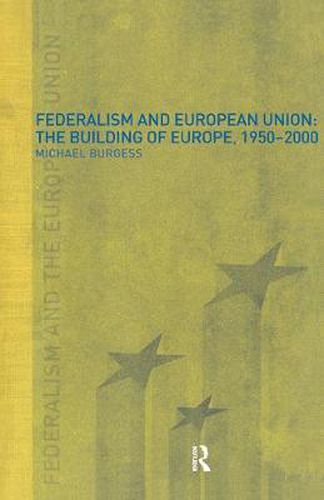Readings Newsletter
Become a Readings Member to make your shopping experience even easier.
Sign in or sign up for free!
You’re not far away from qualifying for FREE standard shipping within Australia
You’ve qualified for FREE standard shipping within Australia
The cart is loading…






A revisionist interpretation of the post-war evolution of European integration and the European Union (EU), this book attempts to reappraise and reassess conventional explanations of European integration. It adopts a federalist approach which supplements state-based arguments with federal political ideas, influences and strategies. By exploring the philosophical and historical origins of federal ideas and tracing their influence throughout the whole of the EU’s evolution, the book makes a significant contribution to the scholarly debate about the nature and development of the EU. In order to reinstate federalism as a major influence upon both the origins and evolution of the EU, the book looks at federal ideas stretching back to the 16th century and demonstrates their fundamental continuity to contemporary European integration. It situates these ideas in the broad context of post-war Western Europe and underlines their practical relevance in the activities of Jean Monnet and Altiero Spinelli. Post-war empirical developments are explored from a federalist perspective, revealing an enduring persistence of federal ideas which have been either ignored or overlooked in conventional interpretations. The book challenges conceptions of the post-war and contemporary evolution of the European Union, to reassert and reinstate federalism in theory and practice at the very core of European integration.
$9.00 standard shipping within Australia
FREE standard shipping within Australia for orders over $100.00
Express & International shipping calculated at checkout
A revisionist interpretation of the post-war evolution of European integration and the European Union (EU), this book attempts to reappraise and reassess conventional explanations of European integration. It adopts a federalist approach which supplements state-based arguments with federal political ideas, influences and strategies. By exploring the philosophical and historical origins of federal ideas and tracing their influence throughout the whole of the EU’s evolution, the book makes a significant contribution to the scholarly debate about the nature and development of the EU. In order to reinstate federalism as a major influence upon both the origins and evolution of the EU, the book looks at federal ideas stretching back to the 16th century and demonstrates their fundamental continuity to contemporary European integration. It situates these ideas in the broad context of post-war Western Europe and underlines their practical relevance in the activities of Jean Monnet and Altiero Spinelli. Post-war empirical developments are explored from a federalist perspective, revealing an enduring persistence of federal ideas which have been either ignored or overlooked in conventional interpretations. The book challenges conceptions of the post-war and contemporary evolution of the European Union, to reassert and reinstate federalism in theory and practice at the very core of European integration.